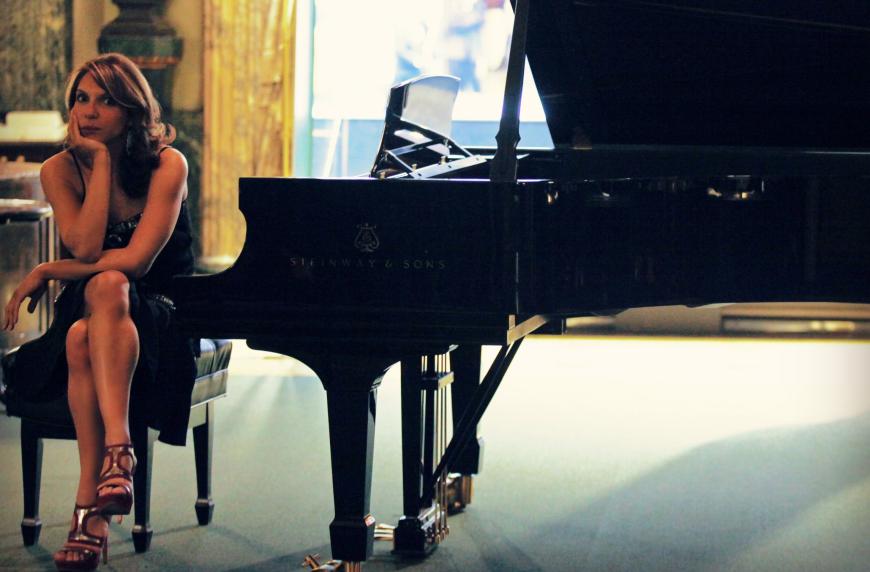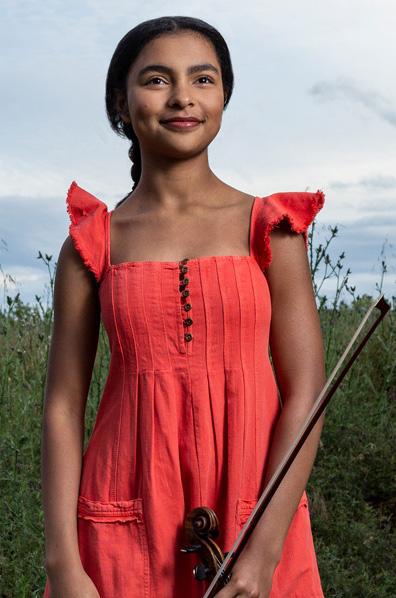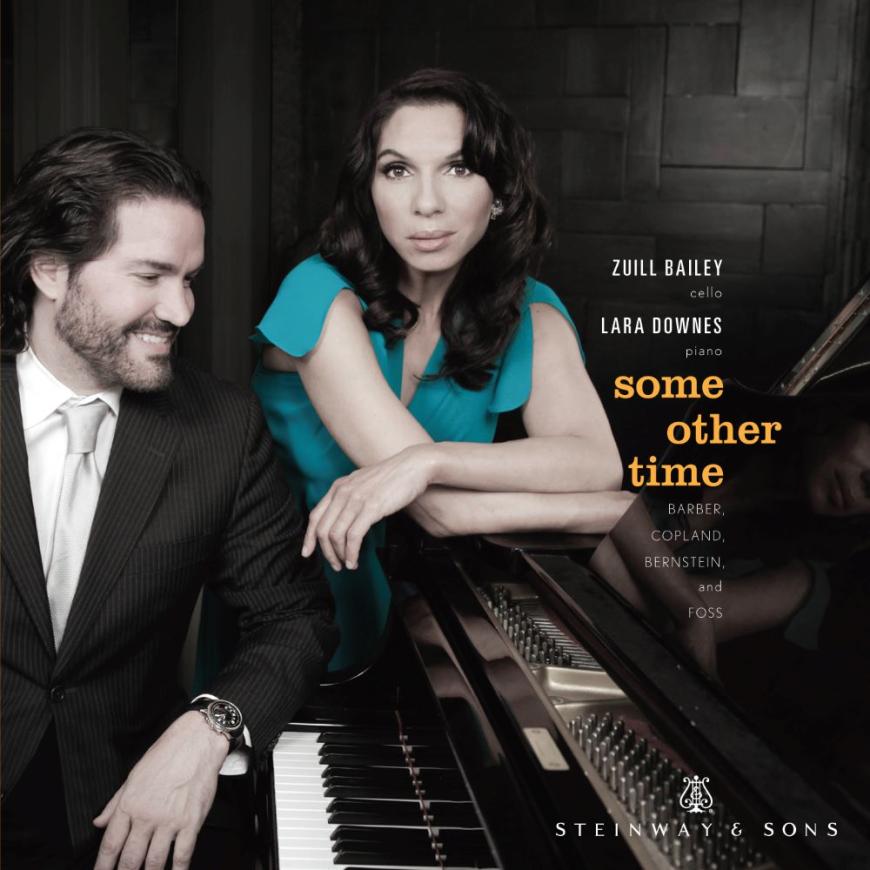
A few weeks ago, KDFC radio launched a new live talk-and-performance series hosted by the indefatigable pianist and Classical California Resident Artist Lara Downes. Classical Americana Live brings Downes together with three artists “whose work mines the American musical landscape to uncover its buried treasures.” It’s a series about intersections and cross-pollination.
The concerts-with-conversation take place at KDFC’s new home at the San Francisco Conservatory of Music’s Bowes Center and are available later on Classical California’s YouTube channel. In February, violinist Daniel Hope joined in for a conversation about the emigre composers who helped found the music departments of the Hollywood movie studios. On March 16, young violinist Amaryn Olmeda, a student at SFCM, chats with Downes about the music of composers Florence Price, Margaret Bonds, Jessie Montgomery, and others as part of a Women’s History Month theme. And in May, New York Times columnist and cultural commentator John McWhorter flies out to talk about the musical legacy of Scott Joplin, reprising a conversation he and Downes recorded for WQXR a year ago, after the pianist’s recording Reflections: Scott Joplin Reconsidered came out.
Downes recalls that the idea for Classical Americana Live was part of the original discussions about her resident artist position at Classical California (which combines KDFC in San Francisco and KUSC in Los Angeles.) “Mark Steinmetz from the station asked for a phone call, and we hit it off. He said, ‘I wonder if you’d ever think of doing something for the radio.’ And before my brain knew that the words were coming out of my mouth, what I said was, ‘Well, sure, because I want to be Leonard Bernstein when I grow up.’ My Bernstein thing was about the outreach and the education, and so to harness this media platform as part of that was so interesting to me. So my position was structured from the beginning as a combination of doing stuff online, on air, and doing live events — the live events just took a while to start because of COVID.”
Downes has her fingers in many pies, but she’s done a lot of education and what is called, using corporation speak, “outreach.” She says, “I’ve gotten really comfortable with conversation. Daniel [Hope] and I have the same approach to storytelling, and so [February’s show] was emotional and funny. This concert in March is going to be a little different; it’s a much younger artist. So this conversation is going to be about the music and the stories of composers. And with John, it’ll be like American history through the lens of music. And what I want, as this goes on, is to have all kinds of collaborators, not necessarily only from the classical world, and find the places of connection. It’s a flow. We usually plan out what we’re going to play, and sometimes we play that, and sometimes we don’t.”

Over the past year, Downes has been heavily invested in her new recording label, Rising Sun Music. “We put out so much music last year. I really made a big push, and it almost killed me. We were putting out records every single month, which meant that there was hardly a second to breathe. I mean, I have an assistant and then my PR team, but it’s so much. And the Joplin album also came out on that label, and we have several other major projects in the works.” It’s a relief to her that her latest album, Love at Last, coming out in April, is on Pentatone (which is now owned by SFCM).
Like most of her albums and like the Classical Americana Live series, Love at Last is about histories intersecting in ways that create American culture. “It’s really interesting to take music from America Again [one of Downes’s previous albums], which was years ago now, and we’re still dealing with unexpected connections — here’s where the histories connect. And that’s my message, whatever I’m doing,” she explains.
In describing the new album, Downes shares an example of how her process works and how serendipity can sometimes be an artist’s best friend.
The core of it is pieces that were written for me or that I found during that time. I think the only thing that mattered to me about music was the ability to communicate and illustrate shared human experience. And the truth of that hit me hard because all of a sudden [during the pandemic] that was the only power that we had. So I amassed a body of work that was speaking to that idea. By the time the conversation began with Pentatone, I really had an album in place.
And it’s funny, this is a weird story — I knew what the album was, I didn’t know what it was called, and then one day this tune just starts going around in my head. And it was this song that we used to sing at Temple Emanu-El when I was a kid, with the cool rabbi with the guitar. All I could remember was the hook and a lyric, which was ‘Laugh at all my dreams, my dearest / Laugh and I repeat anew / That I still believe in man / As I still believe in you.’ Which was kind of what I was trying to say with this record. It’s all terrible, but if we keep on keeping on, take care of each other, try to take care of the planet, and just believe that these things are possible, that’s the only hope.
So I’ve got this song, I don’t know the title, I don’t know who wrote it, and I’m looking on Google, and I finally find some other rabbi guy in some Zoom service who’s singing this song. So then I call my friend, Jeremy Siskind, who’s in L.A. and does a lot of arranging for me, and I’m like, ‘Jeremy, did you go to hippie temple, too? And do you know this song?’ And Jeremy said, ‘Oh yeah, that’s Debbie Friedman.’ And I didn’t know about Debbie Friedman, but she was this feminist songwriter who did a lot of Jewish stuff. And it turns out that this song is a poem from this 19th-century Ukrainian poet who then immigrated to Jerusalem. And it’s this beautiful poem that is kind of considered the birth of Hebrew poetry in the 20th century. So that’s where the title comes from, Love at Last: ‘Let the time be dark with hatred / I believe in years beyond / Love at last shall bind all peoples / In everlasting bond.’”
For Downes, the success of a recording or a project is in having the music represented in tangible form so that people can access it. The mission is to find it, put it out there, tell new or different stories, and just expand the repertory to include music that communicates a wider sense of who we are as humans and Americans.

“I just saw Zuill Bailey in Detroit,” she says about her sometime collaborator on the cello. “We hadn’t seen each other in so long, and you know, Zuill used to be deeply into recording, though he’s not done as much recently. And he was talking about advice that he gives to young people, to his students who are like, ‘I’ve got to make a CD.’ And he’s like, ‘Why are you going to do that? It’s going to cost you a lot of money, and what’s the point?’ And I said, ‘You know, I would not be recording at this volume if I were rerecording the Beethoven sonatas.’
“For me, this is all about, for the most part, all this music that I’m recording doesn’t exist elsewhere, or I’m positioning it in a different way because I feel that there’s another story to tell about it. So for me, the success of it is just that awareness that now it’s there. Some of the things that haven’t been the most splashy — like the Florence Price project that I put out in the middle of the pandemic, digital only — that music incites people. If they hear it on the radio, they go and track me down and send me a personal email about hearing that music. So recordings have impact.
“And that’s what I love so much about radio. It’s the accidental listener.” And a chance to let her inner Bernstein out.




